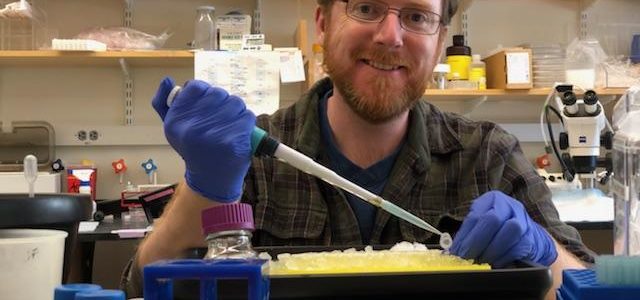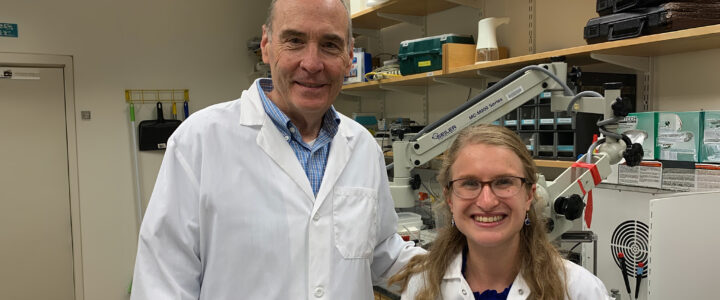Discover how a $100,000 FRAXA grant supports research at MIT targeting neuron dysfunction in Fragile X, aiming to develop new therapies to improve sensory processing and behavior.
Read moreMassachusetts Institute of Technology (MIT)
Drug Tolerance in MGluR5 Clinical Trials – Dr Patrick McCamphill 1:1 with FRAXA

We have long suspected that the clinical trials of mGluR5 blockers from Novartis and Roche failed because the drug triggered tolerance, losing effect over time. With a $90,000 grant from FRAXA, Dr. Patrick McCamphill, a Postdoctoral Fellow in the MIT lab of Dr. Mark Bear, is investigating. He does indeed find tolerance, and now he is looking for ways to overcome it.
Read moreEnhancing NMDA Receptor Signaling to Treat Fragile X Syndrome

Dr. Stephanie Barnes investigated the role of NMDA receptors as a FRAXA Postdoctoral Fellow in Dr. Emily Osterweil’s laboratory at the University of Edinburgh from 2016-2018. With an additional year grant from FRAXA, she then continued her work to identify novel targets and test pharmacological therapies in the Fragile X mouse model at the Picower Institute at MIT with Dr. Mark Bear. Results published.
Read morePharmacological Tolerance in the Treatment of Fragile X Syndrome

With a $90,000 grant from FRAXA Research Foundation over 2018-2019, Dr. Patrick McCamphill, postdoctoral fellow in Dr. Mark Bear’s lab at Massachusetts Institute of Technology (MIT), is investigating drug tolerance to mGluR5 antagonists, arbaclofen, and other potential Fragile X treatments. He is also exploring ways to overcome it.
Read moreMechanisms of Tolerance to Chronic mGluR5 Inhibition

Over the past few years, both Novartis and Roche sponsored large-scale clinical trials of metabotropic glutamate receptor 5 (mGlu5) negative allosteric modulators (NAMs) to treat Fragile X syndrome (FXS). With a $90,000 grant from FRAXA Research Foundation in 2015-2017, Dr. Mark Bear’s team will explore if mGlu5 NAMs dosed chronically causes tolerance, and if so, how it develops and to probe new avenues to prevent or circumvent it.
Read moreDevelopment of a High-Content Synapse Assay to Screen Therapeutics for Fragile X Syndrome

With a $45,000 grant from FRAXA Research Foundation in 2009, Dr. Mark Bear and Dr. Asha Bhakar used High Content Screening (HCS) to develop an assay sensitive to the effect of the FXS genotype. This project was funded in full by NIH after the first year.
Read moreMark Bear’s Goal: Disease-Modifying Treatments for Fragile X

Researcher Mark Bear, PhD, Picower Professor of Neuroscience, sees success developing disease-modifying treatments for Fragile X syndrome and other developmental brain disorders. Finally, hope. And it comes from his lab, The Picower Institute for Learning and Memory, Department of Brain and Cognitive Sciences, Massachusetts Institute of Technology.
Read moreLovastatin Discovery in Fragile X Mice Leads FRAXA to Fund Clinical Trials

Dr. Emily Osterweil was awarded the FRAXA Pioneer Award at the opening dinner of the 2011 FRAXA Investigators Meeting in Southbridge, MA for her work demonstrating that Lovastatin could treat Fragile X. Dr. Osterweil conducted her experiments in the MIT laboratory of Dr. Mark Bear and has since established her own laboratory at the University of Edinburgh. The team discovered that lovastatin, a drug widely prescribed for high cholesterol, can correct excess hippocampal protein synthesis in the mouse model of FXS and can prevent epileptogenesis. The work is published in the prestigious neuroscience journal Neuron: Lovastatin Corrects Excess Protein Synthesis and Prevents Epileptogenesis in a Mouse Model of Fragile X Syndrome.
Read moreRole of Excessive Protein Synthesis in the Ontogeny of FXS

With a $90,000 grant from FRAXA Research Foundation in 2010-2011, Dr. Mark Bear and Dr. Miquel Bosch tested the simple hypothesis that the excessive rate of protein synthesis is not a consequence but the primary cause of the structural alterations occurring in Fragile X syndrome.
Read moreSmall Molecule Modulators of Lithium for Treatment of Fragile X Syndrome

With a $219,500 grant from FRAXA Research Foundation, Dr. Stephen Haggarty from Havard/MIT developed a high-throughput drug screen to find compounds that inhibit GSK3, a critical enzyme in Fragile X. He looked for compounds that can accomplish this either alone or in combination with lithium, offering the possibility of enhancing the effectiveness of lithium as a treatment. His drug screen used patient-specific neural progenitor (NP) cells derived from human induced pluripotent stem cells (iPSCs) – which are created from cells in a skin biopsy from people with Fragile X syndrome (FXS) and other autism spectrum disorders.
Read moreExperimental Compound FRAX486 Reverses Signs of Fragile X in Mice

With an $81,000 grant from FRAXA Research Foundation from 2005-2006, Dr. Susumu Tonegawa and his team at MIT studied the enzyme PAK to determine how it could be used for a treatment target. Results published.
Read more
